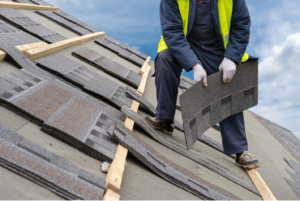Roofers
Roofers install, replace, and repair residential and commercial roofs. They use many materials, including shingles, single-ply and bitumen. They also handle insurance claims and roof inspections.
Roofing contractors often collaborate with other construction professionals on projects. They must follow strict safety protocols and be comfortable working at heights. Contact Roofers Columbus GA now!

Residential roofers work on single- and multi-family homes and apartment complexes. They use a variety of tools to install, replace and repair roofs, including roofing shovels, pry bars, tape measures, ladders and scaffolding. They also interact with homeowners, discussing project details and answering any questions. Many residential roofers offer retail sales, meaning a point person is onsite all day to answer any questions and interface with the crew on your behalf. Some of these roofers are also known as storm chasers, as they target neighborhoods where a high number of insurance claims have been filed.
Our Zippia Research Team has spent countless hours reviewing resumes, job postings and government data in order to provide you with this informative guide on Roofers. We hope you find it useful!
Commercial
Professional roofers offer a variety of roofing services, such as commercial roofing installation and maintenance. They can help businesses choose the best roofing materials to suit their needs and install the roofs properly. They also inspect roofs to identify potential problems and recommend appropriate repair procedures.
Compared to residential roofing, commercial roof projects are usually more complex. They often involve larger buildings and may require more specialized roofing materials, such as steel or tile. Commercial roofers have more experience working on high-rise buildings and are able to work in extreme weather conditions like hot summers and freezing winters.
Many business clients are very specific about the type of roof they want. They might ask for a particular roofing material, a specific roof size or a warranty length. Skujins works with engineering firms, roof consultants and property managers who demand that he meet these specifications.
Developing strong relationships with clients is important when it comes to commercial work. For example, when he’s reroofing a building, he tells the property manager that he will deal with them directly rather than handing off instructions to multiple people. This saves him time and makes it easier to keep the project running smoothly. It’s also better from a liability standpoint, as mistakes on large commercial jobs can cost tens of millions.
Storm Chaser
The term storm chaser is commonly used to describe roofing contractors who travel to areas after severe weather. These companies may distribute pamphlets, knock on doors or call homeowners on the phone. They are typically from out of state and claim to be working directly with insurance companies to cover the cost of repairs. Unfortunately, these storm-chasing roofers are often unlicensed and uninsured which leaves homeowners vulnerable to shoddy workmanship, fraud, and liability issues.
Some of the most common warning signs to look out for include high-pressure sales techniques, a lack of local presence and asking for upfront payments before beginning work. This is a red flag as reputable roofing professionals will usually accept payment upon completion of the project or in stages throughout the process. Additionally, many storm chasers will not provide a warranty on their work which can leave homeowners with costly repair bills in the future.
Using fear as their main selling point, these storm-chasing roofers will often try to scare homeowners into signing a contract with them and hiring them for roof repairs. They will tell homeowners that their time is limited or that their insurance claims are expiring and that they need to act immediately. They will also undercut prices of local roofing companies to make their offers seem more appealing. They then complete the work shoddily and quickly and move on to the next storm-hit area.
A quality local roofer will never contact you by door to door solicitation and will have a solid reputation for their work. They will be referred to you by other satisfied customers and have a permanent office location within the community. A reliable local roofer will always be licensed, insured and have an established business presence in the area.
It is easy to get lured into working with a roofing company that promises low costs and quick work after a recent storm. However, it is critical to research the company and read reviews before hiring them. Taking the time to hire a reputable roofer will ensure that your roof is properly repaired and will last for years to come.
Retail Sales
Whether your roof is damaged by a storm or you’re looking to make an upgrade, many home improvement projects can be expensive. But they don’t have to break the bank. You can choose from a variety of roofing options that will suit your budget and improve the look and feel of your home.
Service roofers do both insurance work and non-insurance replacements. They’ll take care of the insurance process for you and often have multiple crews available to get your job done quickly. They aren’t the cheapest option but can usually compete fairly with most other companies when it comes to price and quality of materials.
They may offer a long sales presentation and present you with all their options right away. Expect to negotiate on pricing and materials to get the best deal. They’ll have a point person who is onsite throughout the project and can answer your questions and interface with the crew on your behalf. They’ll also be able to help you find financing. If they’re offering zero-percent financing, be wary as there are typically hidden costs.